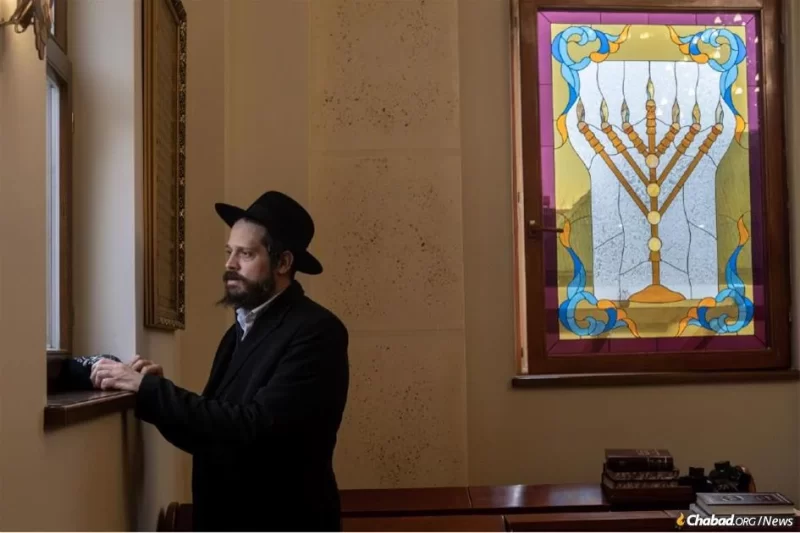
In Ukraine, Rosh Hashanah Heralds a Reawakening of the Jewish Soul
by Faygie Levy Holt – chabad.org
Amid the nightly buzz of armed drones over the capital city of Kiev and continued missile attacks on cities and towns around the country, Jews in Ukraine gathered together on Saturday night to recite Selichot, the penitential prayer that precedes Rosh Hashanah, which begins this year before sundown on Friday night, Sept. 15, and lasts through nightfall on Sunday, Sept. 17.
This is the Jews of Ukraine’s second Rosh Hashanah living in a war zone. During the last year-and-a-half of endless fighting, Chabad-Lubavitch emissaries throughout Ukraine have seen more and more Jews choosing to connect with their heritage, and as the Jewish New Year dawns they are determined that the holiday be a beautiful and meaningful one.
“Since this war began, we’ve seen such a reawakening here of the Jewish soul,” said Rabbi Moshe Moskovitz, who along with his wife, Miriam, leads Chabad-Lubavitch of Kharkov. “It’s more than it’s ever been, and we’ve been here for 33 years.”
Rosh Hashanah, the rabbi explained, is particularly expressive of the innate yearning of the Jewish soul he and his rabbinic colleagues have been witnessing.
“The cry of the Shofar is like the cry of the child who is far away and comes back home,” Moskovitz said. The Jews in Ukraine are “very, very thirsty for their Judaism. They are coming back to their roots. More people are coming to the synagogue to pray. More people are coming to Torah classes, and more people are coming to any activity—literally any program we run is filled to the brim.”
In advance of Rosh Hashanah, he said, “We’ve given out hundreds and hundreds of food packages and supplies for Rosh Hashanah with the help of the JRNU (Jewish Relief Network Ukraine). More and more people now know about Rosh Hashanah and we are expecting, hopefully, a very large crowd of more than 500 people,” at Kharkov’s domed Choral Synagogue in the city center.
In addition to synagogue services, Moskovitz and visiting rabbinical students will also be blowing the shofar for those in the community who are homebound and won’t be able to attend synagogue on the second day of the holiday, Sunday, Sept. 19.
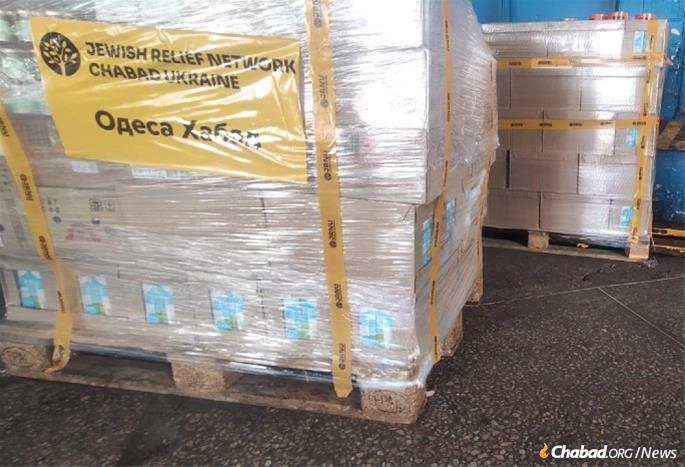
More Than 50,000 to Receive Humanitarian Aid
In total, an estimated 50,000 people will receive food and other humanitarian aid in advance of Rosh Hashanah this year, produced and distributed through JRNU, Chabad’s boots-on-the-ground aid network of emissaries and volunteers. Some of the recipients—mainly the infirm or elderly—will receive food that can be prepared at home, including basics like buckwheat, pasta and rice. Thousands of others, however, will be partaking in communal holiday meals at their local Chabad center or synagogue.
“We have trucks crisscrossing the country—Kharkov, Dnipro, Odessa, going all over—to ensure that wherever people are, they will have good holiday meals and access to food that adheres to the highest standards of kosher,” said Rabbi Shlomo Peles, executive director of JRNU.
This year, a new food-relief program by Chabad-Lubavitch to manufacture, produce and bake kosher foods within Ukraine will ensure that Jews will have a sufficient supply of items when they sit down to their Rosh Hashanah and Sukkot holiday meals. The program represents a shift from kosher food imports to local production in response to wartime disruptions in the food supply.
Manufacturing kosher food in Ukraine not only instills local pride, said Peles, but aids the country’s struggling economy as well. “We want to help the local communities,” said Peles, “and we are always thinking of how we can get people back to work and make things close to normal, and this is part of it. It’s also why we are making sure our schools reopen this year—some in person, some online, depending on where they are—because we want the children to feel as normal as possible.”

It is a somewhat new normal as the country continues to be in the midst of war, and people have found ways to adapt. In increasing numbers within the Jewish community, that means reconnecting to their heritage.
“Jews who before the war had never visited a synagogue or a Jewish community center have started coming to services because they feel that in a time of war, the key place to be is surrounded by community,” said Peles. “What people outside of Ukraine need to know is that all the synagogues, all the Chabad Houses, will be open in Ukraine with full prayer services and full communal meals. We have to make sure that the Jews in Ukraine feel exactly the same way Jews in Israel and the United States and around the world feel on Rosh Hashanah.”
The Sound of Shofar Around Ukraine
In the western part of the country, deep in the Carpathian Mountains, Rabbi Mendel and Sarah Wilhelm of Chabad of Uzhgorod are ensuring that everyone can hear the shofar and attend holiday meals. “We’re expecting between 100 to 120 people to come to synagogue in Uzhgorod on Sunday to hear the shofar and enjoy a community lunch,” said Sarah Wilhelm. The Friday-night meal, on the first night of Rosh Hashanah, is also slated to draw a crowd, with dinner including a variety of symbolic foods.
In some of the smaller surrounding villages, like the storied town of Munkacs, there will only be about 20 or so who will celebrate the Jewish New Year. Still, Chabad will have yeshivah students on hand to lead the services and ensure that people there hear the shofar.
Younger residents of Uzhgorod have already started to prepare for the holiday. “We have a kids program every day after school for Jewish children here,” said Sarah Wilhelm. “They come to us, and they can do their homework together, have a meal and learn about Jewish studies. We’re teaching them about Rosh Hashanah all week.”
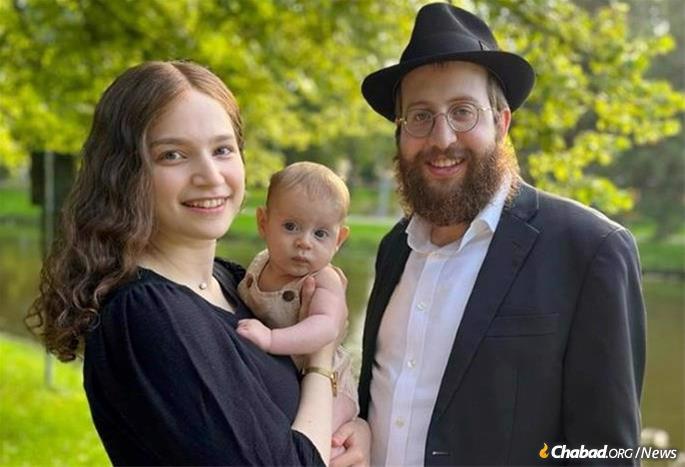
Also in Western Ukraine, Rabbi Mendy and Mushky Halperin—the first emissary couple to move to Ukraine since the onset of the war—will be helping to lead Rosh Hashanah services and meals, as Chabad of Chernovtzy is gearing to host more than 500 celebrants.
“Thankfully, the war has largely bypassed Chernovtzy,” said Rabbi Mendy Glitzenstein of Chabad of Chernovtzy. “Our community hasn’t seen the same exodus as many of our neighbors and on the contrary; it’s flourished as Jews from all over Ukraine sought sanctuary here.”
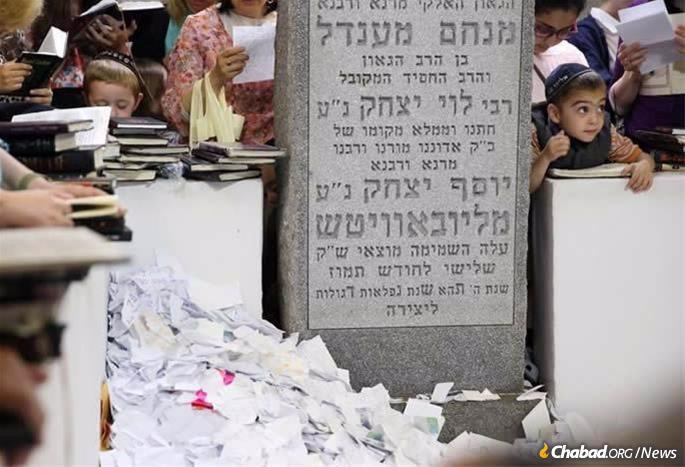
Petitions for Blessings From On High
Throughout Ukraine, thousands of Jews will be joining Jews from around the world in emailing requests for blessings from On High that will be placed at the resting place of the Rebbe—Rabbi Menachem M. Schneerson, of righteous memory—before Rosh Hashanah.
A native of Ukraine, the Rebbe escaped Nazi Europe to the United States in 1941, where he would remain for the rest of his life. During the second half of the 20th century, the Rebbe—widely considered the most influential rabbi of modern times—spearheaded a revival of Jewish life all over the globe.
Long after his departure from what was then the Soviet Union, however, the Rebbe continued leading and guiding Jews trapped behind the Iron Curtain, sending inspiration, blessings and supplies via a stream of clandestine agents.
He was known to them as dyedushka, Russian for “grandfather,” and it happened more than once that the Rebbe broke down crying as he spoke in public about the plight of Soviet Jewry. When chinks began to appear in the Iron Curtain, the Rebbe’s emissaries provided religious and social services for those who left for the West. In 1990 the first permanent emissaries were sent to the Soviet Union, among them Moskovitz family in Kharkov and Rabbi Shmuel and Chana Kaminzeki in Dnipro. The independent country of Ukraine was declared a year later.
As Jewish people all over Ukraine continue to face a once-in-a-generation crisis, it is natural for them to turn to the Rebbe once again, sending friends and family members to pray for them at the Ohel, the Rebbe’s resting place in Queens, with others sending their petitions via email or online form.
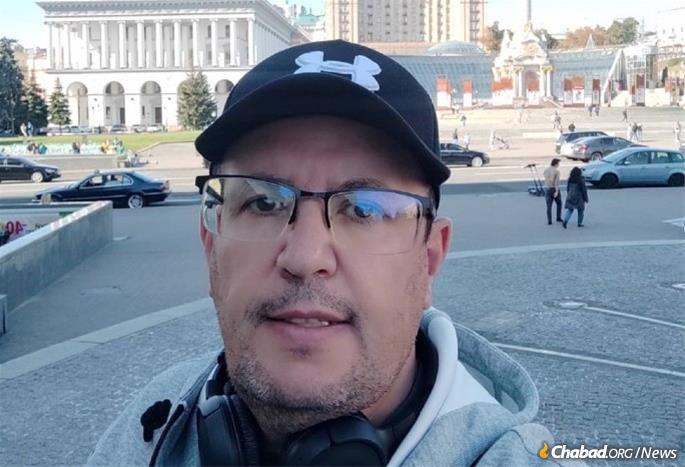
Reflection and Gratitude
Despite the hardships of war, Dovid Smurov of Cherkassy said he is looking forward to experiencing Rosh Hashanah this year. First and foremost, he said, Rosh Hashanah remains the Day of Judgement.
“Rosh Hashanah is a time for us all to stop and reflect on the past year,” said Smurov. “This is a time to look at our actions, see our mistakes and try to be better in the coming year.”
An active congregant at Chabad of Cherkassy, directed by Rabbi Dov and Chana Axelrod, Smurov explained that he feels he has a lot to be grateful for.
“Rosh Hashanah for me is associated with my deep gratitude to G‑d,” said Smurov. “I am especially grateful to the Almighty for the family warmth, friendship and support that I find in Chabad, for our connection as a community, and for our being able to celebrate Rosh Hashanah together after all we have been through. I cannot help but mention Rabbi Axelrod and his wonderful family, who have accompanied the Jews of Cherkassy on this path of self-fulfillment and self-development through these difficult times.”
Rabbi Axelrod said that Chabad in the central Ukrainian city was expecting 200 people to come and hear the shofar, and that large prayer services and four community meals will be held during Rosh Hashanah.
“It is amazing to see the mix of seriousness and innocence that the local Jews have when they come to hear the shofar,” said Axelrod.
“It is just like when the Jews got the Torah for the first time—we came to the mountain and heard the shofar as one nation and with one heart.”













